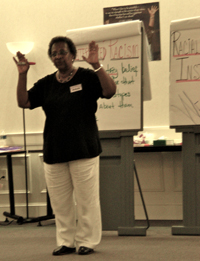People of conscience throughout the United States face the painful realities of life in a racist, sexist, classist, et al, society. Hate group rhetoric and violence increases daily. Privileged politicians tell us the playing field is now level, while they vilify teenage mothers, immigrants, Lesbians, gay men, bisexual or transgender people, people living with a disability or living in poverty, and attack Affirmative Action. Corporations promote diversity and unity in their advertisements, while maintaining oppressive policies and practices.
Each organization, each community, is a microcosm of U. S. society, molded and informed by the nation’s social and political history. No institution or community evolves in a vacuum, in isolation from current and historical influences and constraints of U. S. society. No particular incident of racial or gender intolerance, homophobia, anti-Semitism, ableism, et al, occurs in isolation from the history of our organization or of this country. Yet, we most often attempt to resolve it as if it were. We manage incident to incident, crisis to crisis, and then wonder why real resolution seems further and further from our reach.
A natural inclination is to defend our organization from charges of sexism or racism or any oppression. Objective scrutiny of U. S. history, however, may help us move beyond our defensiveness and denial. We have inherited a legacy of racism, sexism, classism, heterosexism, anti-Semitism, ableism and ageism. This legacy was also inherited by every U. S. institution. We need not put ourselves in the position of defending a diseased system. We cannot be blamed for the creation of oppressive institutions, but we must and will be held accountable for colluding with their continuation. Our responsibility then, is to take every action possible to dismantle all forms of oppression.
Too often an organization’s “racial problem” becomes focused on the person of color who recognizes and names an experience of racism. Such focus is misdirected. The person who names racism is not the problem. Racism is the problem. Just as women of all colors who identify and name sexism are not the problem; sexism is the problem. Appeasing or “shooting the messengers” does not cure the root disease, but simply reacts to the symptoms. How do we cure this disease? We begin by honestly naming it: oppression, the historical and contemporary, systemic disenfranchisement (whether intentional or not) of whole groups of people. While naming oppression is the crucial first step, dismantling it takes longer. We must challenge the institutional foundations that continue to foster racism, classism, sexism and all forms of oppression.
Dismantling oppression requires committed leaders who are trained in uncompromising analysis and skillful implementation of anti-oppressive organizational and community change.
The challenge before us is daunting. Racism and all forms of oppression have infected every aspect of life in the United States since colonization first began. But limited success in dismantling any oppression in our past should not deter us now. No U.S. American has ever lived in a non-racist, non-sexist nation. We haven’t been taught all the skills we need to create or live in such a society. Together, we all can learn these skills for anti-oppressive, empowering, multicultural living. This may, indeed, be the most crucial of contemporary learning: how to build a truly just and affirming community.
About cultural bridges to justice

